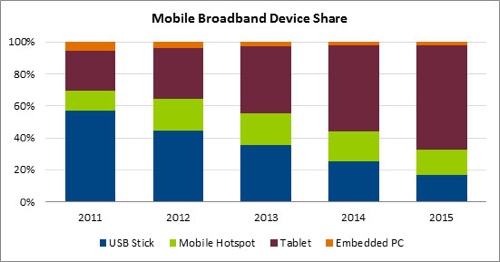By the end of 2015, active mobile broadband devices are forecast to reach 34 million, a nearly 50% increase from 2013, according to The NPD Group “Connected Intelligence Mobile Broadband Market Share and Forecast Report.” Two-thirds (66 percent) of those devices will be tablets.
Driven primarily by enterprise demand, USB stick modems were the primary mobile broadband devices until the end of 2012, says The NPD Group (www.npd.com). Standalone mobile hotspots gained popularity in 2011 and 2012, but both devices have seen substantial declines over the year as more consumers are utilizing the hotspot features on their tablets and smartphones.
Tablets currently account for 40% of mobile broadband connections, and as USB sticks and mobile hotspots decline, carriers will need to boost adoption of the connected tablet. As this shift occurs the price of embedded cellular tablet should rapidly decline.
“Tablets are the next subscriber battleground for the carriers,” says Brad Akyuz, director, Connected Intelligence. “The decline in ASPs, coupled with the intensified pricing competition, will further boost connected tablet adoption in the coming years. AT&T currently leads in active tablets connections, but we anticipate Verizon Wireless will surpass AT&T by the end of 2015. While all of this is great news for consumers who want an always-on tablet, it could drive the carrier market back into a subsidized device model just as this is beginning to fade for smartphones.”



